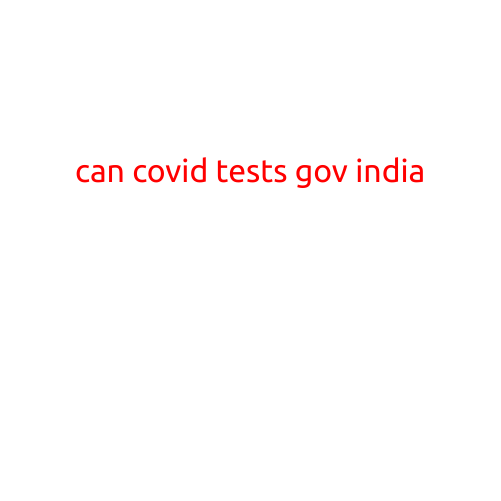
Can COVID Tests Govern India?
The COVID-19 pandemic has brought the global health system to its knees, with India being one of the worst-affected countries. The rapid spread of the disease has made it essential for governments worldwide to implement measures to control the outbreak. In India, the government has been working tirelessly to contain the spread of COVID-19, and one of the most crucial tools in its arsenal is COVID testing.
What is COVID Testing?
COVID testing, also known as SARS-CoV-2 testing, is a laboratory test used to detect the presence of SARS-CoV-2, the virus that causes COVID-19. There are several types of COVID tests, including:
- Rapid Antigen Test (RAT): This is a quick, point-of-care test that uses a nasal swab to detect the presence of the virus’s antigens.
- Reverse Transcription-Polymerase Chain Reaction (RT-PCR): This is a molecular test that detects the genetic material of the virus using a nasal or throat swab sample.
- Antibody Test: This is a blood test that detects the presence of antibodies (proteins) produced by the body in response to a COVID-19 infection.
Why Are COVID Tests Important for Governance?
COVID tests are essential for governance in several ways:
- Contact Tracing: Accurate COVID testing enables contact tracing, which is the process of identifying and tracking individuals who have come into close contact with someone infected with COVID-19.
- Quarantine and Isolation: COVID testing helps identify individuals who need to be quarantined or isolated to prevent the spread of the virus.
- Early Detection: COVID testing allows for early detection of cases, which enables prompt treatment and reduces the risk of severe complications.
- Surveillance: COVID testing provides valuable insights into the spread of the virus, enabling policymakers to monitor the situation and make informed decisions.
Challenges in India
Despite the importance of COVID testing, India has faced several challenges, including:
- Limited Testing Capacity: India has struggled to increase its testing capacity, leading to delays and backlogs in testing.
- Lack of Testing Kits: India has faced shortages of testing kits, particularly RT-PCR kits, which are critical for detecting the virus.
- Limited Access to Testing: India’s rural areas lack access to testing facilities, making it difficult to identify cases and contain the spread of the virus.
What Can Be Done
To address these challenges and ensure effective COVID testing governance in India, the following measures can be taken:
- Increase Testing Capacity: Governments and private organizations should work together to increase testing capacity and reduce delays.
- Import High-Quality Testing Kits: India should import high-quality testing kits, including RT-PCR kits, to ensure accurate and timely testing.
- Establish Community Testing Centers: Community testing centers should be established in rural areas to make testing more accessible.
- Invest in Digital Health Infrastructure: India should invest in digital health infrastructure, including electronic health records and telemedicine platforms, to facilitate remote testing and monitoring.
Conclusion
In conclusion, COVID tests are essential for governance in India, enabling policymakers to contain the spread of the virus and protect the lives of citizens. While challenges persist, the government and private organizations can work together to address these challenges and ensure effective COVID testing governance.





